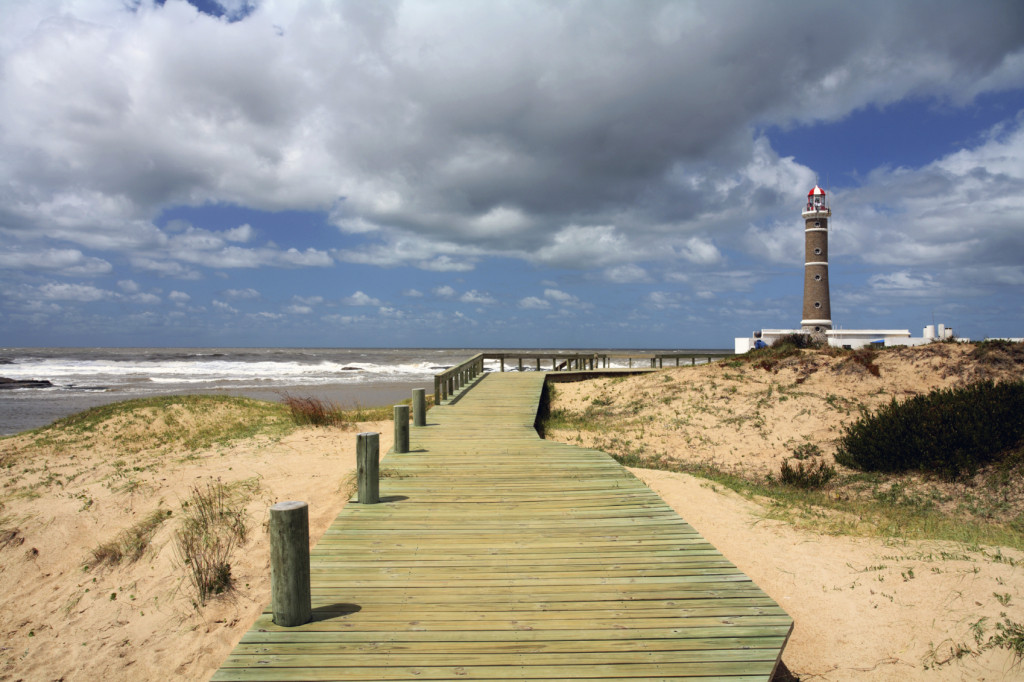Uruguay is a country that has several options for the traveller who likes rural landscapes, beaches and spas. From small streams, wetlands, indigenous forests, vast stretches of countryside and geoparks, to comprehensive thermal springs and idyllic beaches. In this section you will find advice and basic information to travel along the coast and the interior of our country. Click on a region on the map or use the menu on the left to learn more about Uruguay, its natural charms and its World Heritage sites.
Also called “the Switzerland of America,” the Oriental Republic of Uruguay is a country that offers many options to enjoy nature, peace and quiet, fresh air and beautiful beaches. Since it is one of the smallest countries in South America, the distances are very small. So small that to cross the country by bus from north to south takes no more than seven hours. Uruguay is one of the safest countries on the continent.
The name “Uruguay” comes from the language Guaraní and has a few different translations such as “river where the bird lives,” “river of the painted birds,” “river of the snails,” “winding river.”
Geography:
Located in South America, Uruguay has coasts on the Atlantic Ocean, between 30°S and 35°S latitude and 53°W and 58°W longitude. It borders Brazil in the north and northeast, Argentina in the west across the Uruguay River, the River Plate to the south and the Atlantic Ocean to the east.
Its privileged position in the Southern Cone of the continent is very advantageous because it allows a policy of regional integration. Besides being the exit port of the countries of the Rio de la Plata basin, it is also a bridging country between Argentina and Brazil. In terms of global connectedness, Uruguay’s Atlantic coasts allows for fluid communication and linking with the world’s most developed countries.
Uruguay, which is divided into 19 departments, has 450 km of coastline along the River Plate and 220 km of coastline on the Atlantic Ocean. This results in numerous sandy beaches noted for their beauty. Because it has the best natural harbor in South America, the country was born as a strategic attempt by the Spanish Crown to consolidate a second stronghold in America (the first was Cartagena de Indias).
Montevideo, the capital of Uruguay, emerging from the bay of the River Plate and rising up to the unmistakable Cerro (hill), has a range of services (technological, accessibility, security, urban) and buildings typical of a modern metropolis.
Climate
Uruguay enjoys a moderate climate because of its location in a temperate zone of the southern hemisphere. The average temperature in spring is 17°C; Summer 25° C; in the fall of 18°C in winter and 12°C. Extreme temperatures can reach 40°C in summer and -2°C or -3°C in winter. However there are sunny days all year-round, and in the autumn the cold is shared by clear skies. Winds from the north are predominantly hot and humid, whilst those from the Pampas and the south are cold and dry.
Population
Given its open-door immigration policy, the population of Uruguay, sitting at around 3,395,000 inhabitants living mostly in cities, consists of a mix of European origin, particularly Spanish and Italian, and African origin (dating from the Spanish Conquest). The latter, although they constitute only 8% of the total population, still have an essential cultural influence in our society today. The indigenous population completely disappeared over a century ago, which differentiates Uruguayans from other Latin Americans.
Uruguay has the lowest birth rate in South America but life expectancy is high, on average 72 years for men and 74 for women, indicating a high level of health and nutrition.
People
Uruguayans are a cultured people, and are open and friendly with travellers, whom they always want to help and get to know. They are characterized by their relaxed nature, sincerity and familiarity. Always willing to engage in conversation, they love to share their knowledge of the country and integrate newcomers.
Safety
Uruguay is privileged to be one of the calmest, most stable countries in Latin America. Whilst Montevideo is a capital city, it remains a peaceful and friendly place where you can enjoy wandering the city streets and walking along the rambla at sunset without problems.
Visa
Upon entering the country, each visitor receives a visa to enter the country, effective for ninety days. You may renew it for ninety days by applying at any customs office.












